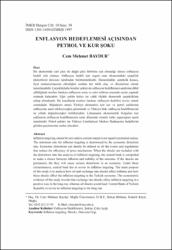Enflasyon hedeflemesi açısından petrol ve kur şoku
Abstract
Bir ekonomide cari çıktı ile doğal çıktı birbirine eşit olmadığı sürece enflasyon hedefi sıfır olamaz. Enflasyon hedefi için asgari oran ekonomideki çarpıklık (distortion) derecesi tarafından belirlenmektedir. Ekonomideki çarpıklık kısaca, fiyat mekanizmasının etkinliğini azaltan her türlü olay ve düzenleme olarak tanımlanabilir. Çarpıklıklarla beraber şoklar da enflasyon hedeflemesi analizine dâhil edildiğinde merkez bankası enflasyon oranı ve çıktı istikrarı arasında seçim yapmak zorunda kalacaktır. Eğer şoklar kalıcı ise ciddi ölçüde ekonomik çarpıklıklara sebep olmaktadır. Bu koşullarda merkez bankası enflasyon hedefini revize etmek zorundadır. Makalenin amacı Türkiye ekonomisi için kur ve petrol şoklarının enflasyonu nasıl etkileyeceğini göstermek ve Türkiye’deki enflasyon hedeflemesini ne yönde değiştireceğini belirlemektir. Çalışmanın ekonometrik bulguları kur şoklarının enflasyon hedeflemesine uzun dönemde olumlu katkı yapacağına işaret etmektedir. Petrol şokları ise Türkiye Cumhuriyet Merkez Bankasının hedeflerini gözden geçirmesine neden olacaktır. Inflation targeting cannot be zero unless current output is not equal to potential output. The minimum rate for inflation targeting is determined by the economic distortion rate. Economic distortions can shortly be defined as all the events and regulations that reduce the efficiency of price mechanism. When the shocks are included with the distortions into the analysis of inflation targeting, the central bank is compelled to make a choice between inflation and stability of the outcome. If the shocks are permanent, the they will cause serious distortions in an economy. Under these circumstances, central bank has to revise its inflation targeting. The main purpose of this study is to analyze how oil and exchange rate shocks affect inflation and how these shocks affect the inflation targeting in the Turkish economy. The econometric evidence of this study reveals that exchange rate shocks affect inflation targeting in a positive way in the long run, whereas oil shocks would lead Central Bank of Turkish Republic to revise its inflation targeting in the long run.


















